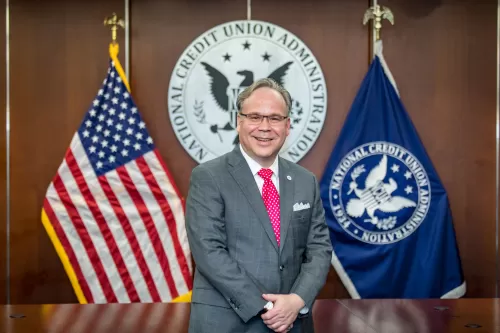NCUA Chairman Todd M. Harper at the NCUA's Headquarters in Alexandria, Virginia.
As Prepared for Delivery on March 18, 2021
Good morning, Justin and Anthony. Thank you for your presentation on the interim final rule and request for comment on enhancements to the NCUA’s Central Liquidity Facility. I appreciate your good work on these important matters.
The Board is issuing this interim final rule to provide clarity and transparency for all stakeholders. These regulatory changes address the potential economic disruptions the COVID-19 pandemic could cause and conform the NCUA’s regulations to extensions of statutory enhancements recently enacted in the Consolidated Appropriations Act at the end of 2020.
Throughout the COVID-19 pandemic, two of my top priorities have been, and will continue to be, ensuring that credit union members are protected and that the credit union system remains strong. In December, Congress enacted the Consolidated Appropriations Act, which included pandemic relief for credit unions and their members. The NCUA Board and staff worked closely with congressional offices to receive this much-needed relief.
Specifically, the year-end funding bill extended several enhancements to the CLF, which were first enacted in 2020 as part of the Coronavirus Aid, Relief, and Economic Security Act or CARES Act. These enhancements were scheduled to sunset on December 31, 2020, and I appreciate Congress extending them to the end of 2021. With these reforms in place, the facility’s lending capacity has tripled to more than $33.6 billion since the start of the pandemic in March 2020.
These temporary changes make it easier for credit unions to join the Central Liquidity Facility, including corporate credit unions to act as agents for consumer credit unions as they once did before the 2008 financial crisis. The enhancements also ease some restrictions around getting a liquidity loan and temporarily increase the facility’s borrowing capacity from 12 times its capital to 16 times its capital through the end of 2021.
When confronted with the early stages of the COVID-19 pandemic one year ago, we experienced, in real time, considerable turmoil in our markets. The NCUA needed to ensure that credit unions would have access to liquidity if other parts of the economy froze up. So, I focused on mission-critical services aimed at containing those risks and called on the NCUA to seek legislation to enhance the capacity and powers of the CLF. NCUA experts worked swiftly to develop a proposal and educate lawmakers about the need for these reforms. I am grateful for their actions.
Congress also acted quickly to adopt those temporary enhancements, and the NCUA staff then acted expeditiously to draft an interim final rule to implement those important reforms. On April 13, 2020, the NCUA Board voted to issue that initial rule to provide credit unions with greater access to liquidity. Today, we are extending that interim final rule to ensure that credit unions remain on a strong operational footing during the COVID-19 pandemic’s economic fallout.
The temporary changes and increased flexibilities provided by Congress to the NCUA’s CLF are very useful, but in my view, we should pursue permanent reforms. Any time there are economic contractions, we can expect credit unions’ liquidity needs to rise. Those liquidity needs may spike after the current expiration date of these statutory changes, or they may jump during a future economic crisis.
As such, I will continue to urge Congress to make the CLF provisions first incorporated into the CARES Act permanent. Permanence would provide regulatory certainty during the current crisis and bolster the credit union system’s ability to respond to future emergencies.
Lastly, I strongly encourage all consumer credit unions that do not already belong — or have access to an agent for the CLF — to join the facility. In doing so, they will demonstrate the best of the cooperative movement.
This concludes my remarks. I now recognize Vice Chairman Hauptman.



